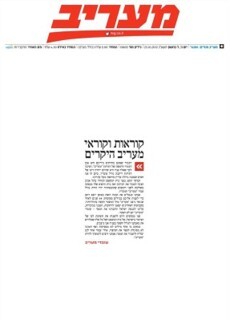Israel's Newspaper Wars
Roy Arad
Maariv, once Israel’s highest-circulation daily paper, until yesterday was facing imminent closure. It was founded in 1948, three months earlier than the state of Israel. A group of journalists resigned from Yedioth Ahronoth, which had been going since the late 1930s, and set up Maariv as a co-operative. It billed itself as an open and independent paper, as opposed to its competitors, many of which were tied to political parties.
Yedioth’s owners, the Mozes family, swore revenge for what they called ‘the putsch’. In the build-up to the 1967 war, Yedioth Ahronoth was freely distributed to the soldiers, and eventually it paid off: a decade later it overtook Maariv.
In the 1990s, Yedioth was reaching 67 per cent of the population on Fridays; Maariv only 25 per cent. The co-operative broke down as Israel began to feel the effects of capitalism. In 1988 the paper had been sold to Robert Maxwell, who was on a shopping spree in Israel. After Maxwell's death, the arms dealer Yaakov Nimrodi bought Maariv. Nimrodi was Israel's military attaché in Iran when the two states enjoyed close relations. After the 1979 revolution, he was implicated in the Iran-Contra scandal. Trying to clear his name, he approached Ido Disenchik, Maariv’s editor-in-chief, and offered him material for a story. Disenchik turned him down. His response, he later claimed, was to inform Disenchik that he would buy Maariv and fire him. Disenchik denies the story, but in any case Nimrodi indeed bought the paper and handed the post of editor-in-chief to his son, Ofer Nimrodi.
In the 1990s it emerged that Yedioth and Maariv were bugging each other’s phones. Many Israelis remember a short clip of Ofer Nimrodi literally eating the evidence against him, when a police investigator left him alone but a concealed camera was capturing every move he made. He was eventually jailed for several months.
Maariv continued to lose both money and readers. Israel HaYom (‘Israel Today’), a free newspaper propagating Binyamin Netanyahu's views and bankrolled by the American casino magnate Sheldon Adelson, was launched in 2007. In July last year its circulation was shown to have surpassed Yedioth Ahronoth’s. Maariv, which had been bought by the billionaire Nochi Dankner a few months earlier, was demoted to third place.
When protesters took to the streets of Tel Aviv last summer, Dankner was one of their main targets. He used Maariv to fight back. Its new editor, Nir Hefetz, had been Netanyahu's press adviser. They published a story claiming that the protests were a conspiracy led by American consultants. Maariv launched a new culture supplement to compete with Haaretz’s, and tried to recruit Haaretz journalists. As a Haaretz journalist, I, too, received an offer by text message. (I’d already worked for Maariv for a while in 1997. My strongest memory is of the long, grubby, uneventful corridors in the paper's offices.)
Dankner, heavily in debt, couldn’t hold onto a loss-making newspaper. The right-wing publisher Shlomo Ben-Zvi agreed to buy it, but said he would keep on only 300 of its 2000 staff. All he really wanted was the brand name. Then it emerged that some of the employees' pensions had disappeared somewhere along the way. The journalists began a series of demonstrations to save the paper and their jobs.
Suddenly the tables were turned. The social protest leaders of 2011, who had been attacked by the Maariv, joined the ranks of the journalists who had previously criticised them. I went on one protest in front of Ofer Nimrodi's $30 million mansion, nicknamed ‘the Israeli White House’, and another at the offices of IDB Holdings, Dankner's company at the Azrieli Centre. The IDB staff switched off the elevators, so the journalists and activists had to walk up 41 floors to reach the offices. Arel Segal, one of Maariv's most popular right-wing journalists who had blasted the social protests, was transformed into a brave champion of workers' rights. ‘When the 2011 demonstrations broke out, I doubted the protesters,’ he told me. ‘Today I doubt my doubts. A person is entitled to change his opinion.’
Maariv may have been saved at the last minute. Following a difficult battle, which included publishing an almost blank front page yesterday, it seems that the workers’ struggle has succeeded. Ben-Zvi will keep on some 1400 of the paper's employees. They have signed a collective agreement with the new owner, the first of its kind in the Israeli press for decades. ‘This is truly an unimaginable achievement,’ Haggai Matar, the acting chairman of the workers' union, wrote on his Facebook page last night.
